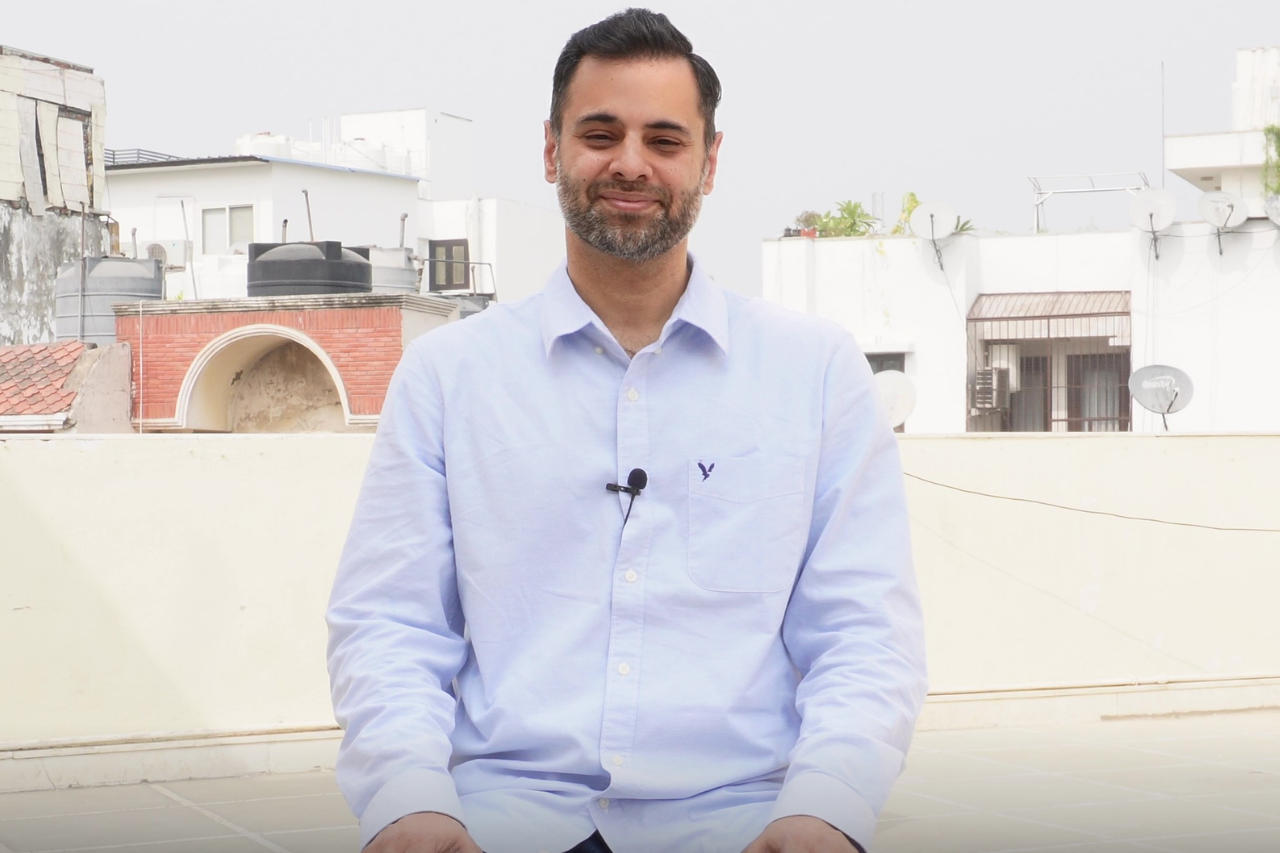“I do not consider anyone to be my disciple. I have never sought upadesh from anyone nor do I give ceremonial upadesh. If the people call themselves my disciples I do not approve or disapprove.”
Ramana Maharshi
In my view, the man who searches for enlightenment is no different from the man who works in his corporate job and looks forward to becoming the CEO.
That man is still better because he is not hypocritical. He is clear about what he wants, along with the fact that he’s willing to do anything to get there.
Spiritual man, on the other hand, is hypocritical and full of dissonance. He searches for peace, not acknowledging the fact that it is the very search that is responsible for his misery.
He moves from one ashram to another; one guru to another; one book to another; he meditates and chants for hours; listens to bhajans (devotional songs); and attends kirtans, all in vain search of finding the ultimate truth.
He idolizes his guru and puts him on a pedestal, for he believes that his infallible guru can give him something he does not have. That conditioning to seek and earn through personal effort is so strong that he’s unwilling to look at what is right in front of him as here and now.
How is it any different from what happens in the material world, where we run after money, fame, recognition, admiration, and so on? A spiritual chase is no different from a material chase.
The spiritual man chasing unattainable goals finds himself impotent and unable to live in the world. First, he uses spiritual teachings as a mechanism to escape the material world.
After seeing the contractions and hypocrisy of spiritual masters he so vehemently and fiercely defended, he becomes depressed and bitter. Even after leaving the master, he cannot let go of the images they instilled in him.
He is still desperate to find the permanent bliss of enlightenment that brings an end to all of his problems, worldly or otherwise. He imagines and objectifies permanency in some form.
He romanticizes the idea of using thought to liberate himself from compulsive thinking. Even after reading the highest scriptures and studying the most profound philosophies, he does not find peace. All the more, he finds himself more confused, irritated, and restless.
I’m not against any spiritual teaching or practices. All of them have benefits, but those benefits are confined only to the mind and body. No practice, method, or technique can be used to attain enlightenment or a permanent state.
Even Ramana Maharshi’s self-inquiry was only for those who were too bound by their conditioning. He used it simply as a tool to create confusion so that devotees could break out of their conditioning.
Self-inquiry was never meant to be a pathway to enlightenment or any permanently blissful state. You see, the moment you genuinely search for an answer to the question, “who am I,” things begin to fall apart.
For most of the world, the idea that this biological organism is purely mechanical and robot-like structure programmed for action and reaction is inconceivable. The sense of self-consciousness or personal identification is powerful, and it resents the question, “who am I.”
The mind creates a futile desire to become thoughtless and experience stillness. The stillness is conceived as having no thoughts, but isn’t that a thought itself?
Stillness is not about blocking anything but simply being aware of the actuality of What-Is. Even in the traditional Vedantic systems, they reinforce the idea “I am Brahman” by repeating it as an affirmation.
Vedantic self-inquiry (not to be confused with Ramana Maharshi’s self-inquiry) uses the Neti-Neti (not this, not this) or “I am not the mind, I am not the body” method to arrive at the ultimate truth.
However, this does not help because we are still not free of the conceptual I-thought. There still remains an identity that believes itself to be Brahman, or not the mind and not the body.
And the moment our body goes through a crisis, the “I-thought” springs up and expands horizontally as the compulsive thinking mind.
Every spiritual teaching is a concept. And all concepts do is simply point to the truth, but they are not the truth themselves. All pointers to the truth are not pointers in the traditional sense.
Think of them as vectors of infinite magnitude but without direction. Therefore, all non-duality pointers point to the here and now. Here and now is the only possibility for finite to become infinite.
And that is not a state which has any worldly advantage whatsoever. It is not apart from the truth. It is not in another dimension but pervades all dimensions. It is not different for you or me. It is that which illuminates “me,” “you,” and the rest of the world.
The greatest difficulty in talking about non-duality is that it can’t be explained without the help of concepts. But the problem is that concepts themselves become a hurdle as we tend to lose ourselves in them.
Therefore, the message conveyed through a concept is not the truth but a pointer to the truth.
Any movement you make in any direction to attain any state is a diversion from the actuality of the present moment or now.
The above statement is a concept and not the truth. Examine it and inquire for yourself.
For example, Buddha’s first noble truth, “samara is dukkha” (the world is suffering), is a concept. It is not an absolute statement. Anyone who totally understands this first truth is already there.
Some people see it as nihilistic and pessimistic, while for others, it’s a great revelation. Suffering comes from the fear of the unknown. And life, by its very nature, is unpredictable.
Therefore, the ego-mind, fearing unpredictability and insecurity, pins the blame on the world. For the world to be suffering, there has to be “someone” there to experience it that way. Once this concept is understood in principle, the rest of the noble truths become irrelevant.
For a child, the world is not suffering, and he (or she) does not even bother to ponder this question. Only the adults with a garbage can of thinking running incessantly in their heads contemplate the prospect of liberation, freedom, or the end of suffering.
Even the animals do not reflect on psychological suffering because they live instinctually and not intellectually. Their suffering is momentary and physical, which is not a concern for them. The animal eats whatever it can manage in the moment when hungry.
It does not crib about the quality or variety of food. The human mind, loaded with a sharp intellect, craves variety and change. This craving intensifies with time and makes the intellect subservient.
It includes the craving for a permanent state of mind of silence and stillness. That craving is no different than any other material craving. And denying or suppressing the craving exacerbates the problem creating more pain and suffering.
Monks and priests have been doing this for ages without credibly verifiable results. They say, “we have what you’re looking for. And we can give it to you if you do what we tell you.”
Ramesh Balsekar told an exciting story about a rich man who was tired of the material world and decided to renounce everything in pursuit of spiritual seeking.
Therefore, he called his guru and told him that he didn’t know what to do with his money and thought of giving it all to a charity. And the guru replied, “it’s great that you’re finally on the spiritual path, but for heaven’s sake, don’t do anything with the money till I come there.”
Trying to get rid of the ego to attain supreme bliss is like a train trying to move without the engine. It’s not going to happen because it’s just a fantasy. The realization of oneness can never be a personal understanding of the conditioned mind.
So the oneness is not an experience but the absence of the “experiencer.” There is no thinking or grasping of anything there. Those familiar with my story may have read about my experience in my house courtyard.
One day after waking up in the morning, I experienced complete unity and love with everything. Before that, I had no spiritual inclinations whatsoever.
I never asked for any experience. I had never done any meditation or Sadhna. I was a complete materialist chasing goals related solely to money and fame.
That indeed was an awakening moment, but that experience did not put me in any permanently blissful state. It was the beginning of spiritual seeking.
After that experience, I spent many years in loneliness and depression, suffering the confusion and conflict of obsessive thinking. At some point, the seeking stopped; I don’t know when and why, but it ceased altogether. Neither did I start my seeking, nor did I end it.
But with the ending of seeking, the mind surrendered and became free of compulsive thinking. The thoughts still arise, but there’s no involvement in thinking carried over as suffering in horizontal time.
The peace that I experience now is not free from the movement of life, which includes both pleasure and pain. Some days are peaceful, while others are painful.
There is no thinking or confusion around pain or suffering. Whatever happens, happens in the moment and does not propagate horizontally in time.
For example, I have been suffering from debilitating lower back spasms for the last twenty years (it got worse in the previous two years), and despite every treatment, the pain persists to this day.
I showed my back to doctors, chiropractors, physiotherapists, and yoga teachers. I also got imaging done that showed no physical abnormalities or deterioration, but still, there was no relief.
There are days when it is challenging to even get up and walk, but there is no thinking around it. “Why me? What have I done to deserve this? Is it my past karma?” And so on. I continue my treatment and accept each day as it comes.
Similarly, when my father passed away a couple of years back, I cried and howled in grief. I miss his physical presence to this day, but there is never a question of why God took him away from me.
The body-mind organism that I knew as my father had to disintegrate, and so it did according to the law of nature. And so will this mind-body organism, known as Jagjot, will disintegrate at some point in the future.
There is no fear of what will happen to my family (wife and two kids) after I’m gone. Life’s natural flow continues for everyone. I feel much closer to my father now than when he was alive. I feel that with him gone, his essence merged into mine.
Only humans remain preoccupied with this idea of attaining and grasping a permanent bliss of enlightenment through personal effort.
They want to make it look like they have earned it by working hard through decades of penance and sadhana. It includes the sacrifice of meditating for hours, long days of fasting, performing rituals, undergoing the torture of lifetime celibacy, eating selected foods, abstaining from all pleasures of life, suppressing natural desires, and completely renouncing the material world.
It is the ego-mind’s favorite trick to achieve the desired goal of having no goals. It says, “once I’m free from all the havings and wantings, I will be in the supreme state of ultimate peace and bliss.” Who wants ultimate bliss? Where does this desire for permanency come from?
If you still want to torture yourself in pursuit of some imagined state, it’s better to run after money and be the CEO. How can you renounce something that was never yours in the first place? And my question to you would be the same as what Jiddu Krishnamurti posed, “what at the end of it?”

